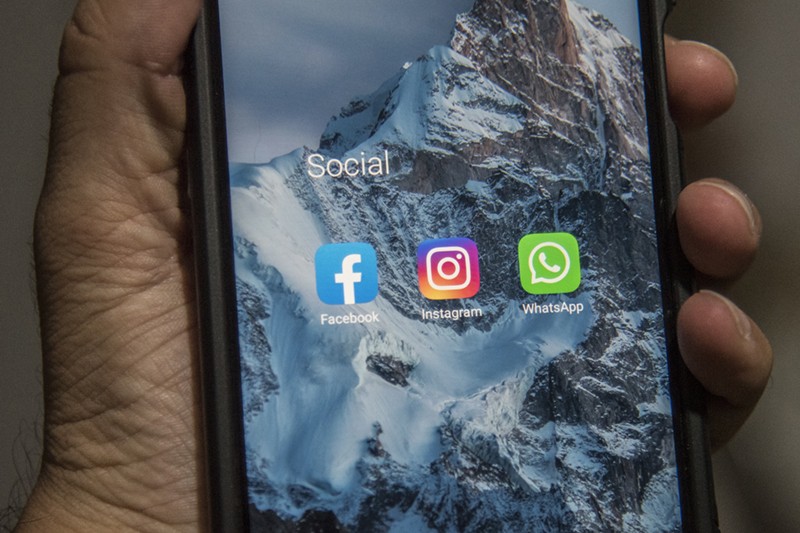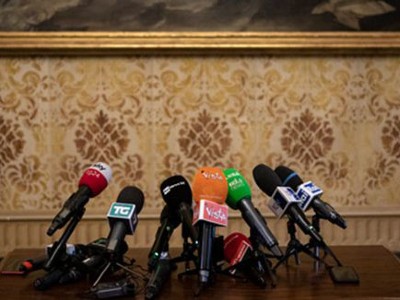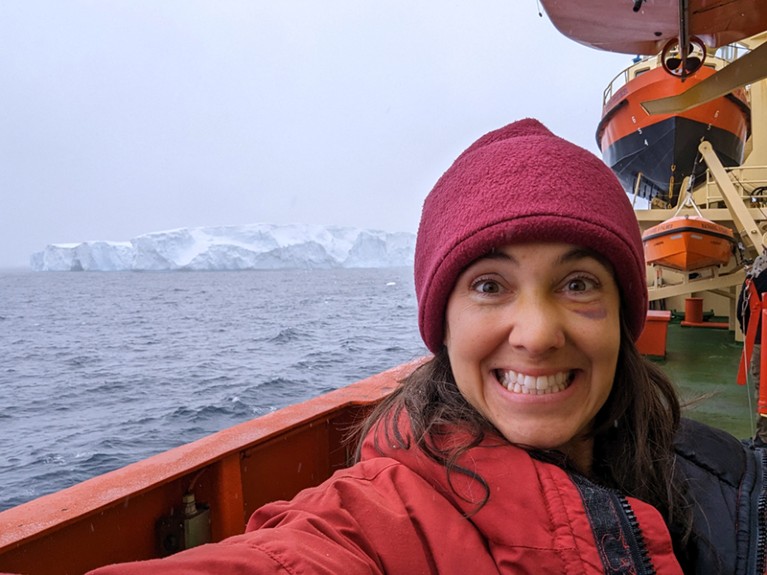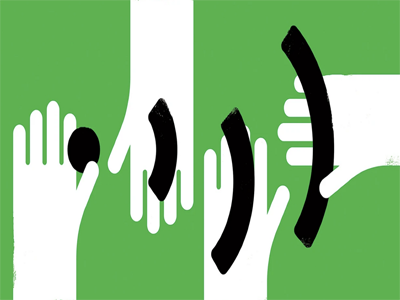WhatsApp is a free messaging platform that doesn’t use much data, so scientists can use it both for research and to share their work around the world.Credit: Ivan Romano/Getty
In March, Holly Bik and Virginia Schutte were a few weeks late departing for East Antarctica, where they would collect sea-floor mud to better understand tiny deep-sea invertebrates. The delay was due to a combination of COVID-19 protocols and port congestion.But their time quarantining in a New Zealand hotel as a COVID-19 precaution was productive.
Shortly before being confined to their hotel, Schutte created a WhatsApp community to keep not just her family, but also the general public, updated on their activities on board the research icebreaker Nathaniel B. Palmer. Schutte — who earned a PhD in ecology in 2014 and then became a science communicator, currently based in New Jersey — was contracted by Bik’s laboratory to grow its social-media presence. Schutte had already been using WhatsApp personally. And while waiting to depart from New Zealand, she and the other expedition members used the platform to share updates and get to know each other.
WhatsApp is the world’s most popular messaging application, with two billion monthly users. Former Yahoo programmers Jan Koum and Brian Acton founded the company in 2009, as an Internet-based alternative to text messaging (which occurs over cellular networks). Facebook — now called Meta — purchased WhatsApp in 2014.
The scientists’ use of WhatsApp comes partly out of necessity — there aren’t a lot of options for Internet communication in the Antarctic, Schutte explains. “Space will have better Internet than where we’re going.”
Because of this, common channels for science communication, such as the social-media platforms TikTok and Twitter, would be less likely to work. WhatsApp requires so little mobile data that it can work in the Southern Ocean, explains Bik, a deep-sea biologist at the University of Georgia in Athens. She hadn’t used WhatsApp in any capacity before reaching New Zealand, where the app isn’t especially popular.
Once they realized that they would be able to use WhatsApp aboard the Nathaniel B. Palmer, they had to decide how to do so. A common way for WhatsApp users to interact is in a WhatsApp group — but those can use more data, because users have a number of ways to interact in the group. Schutte and Bik needed to reduce data usage and sharing of information, so they instead opted for WhatsApp Communities, a feature launched in November 2022. A community is a more controlled version of a typical WhatsApp group: only administrators can send messages, and members can’t view each other’s details. Although a community is less interactive, it’s also more manageable.
Collection: Science communication
One reason that the two decided to create a community rather than a group was to limit the number of messages, given the bandwidth restrictions. Another was to protect members’ privacy, including their own, because the group was open to the public. In the first iteration of the group, Schutte and Bik used their personal phone numbers when sending messages. They soon realized that it would be better to use a separate work-only number obtained from Google Voice, which provides free phone numbers that can be used online.
They haven’t come across any similar WhatsApp community for science communication, and are treating this one as an experiment. Bik says, “just like you can’t predict what species you’re going to find when you sample on the bottom, you also can’t predict” the Internet conditions. These depend on factors including weather and location. So they couldn’t be entirely sure that their WhatsApp community, which is called ‘Antarctic Worms’ and has reached more than 240 members, could be sustained.
In the spirit of this experiment, they’re hoping that the results will be useful to others. “How do you do ship-based outreach in these Internet-poor regions that are really important from a climate-change and ecology and evolution perspective?” asks Bik. “We know that people love expeditions and they want to engage with scientists on ships.”
A mix of features
It’s not only aboard research vessels that WhatsApp can be useful for scientists. Because the app is convenient, popular and free to use, researchers have been using it for collaboration, as well as basic communication. Scientists can find interviewees through public posts on the app, and collect data through private messages.
Easily sharing video is another useful aspect. For example, in India — where WhatsApp is very popular — health professionals have used the app to monitor their patients’ inhaler use through video. Nagesh Dhadge, a respiratory physician at Manipal Hospital in Pune, explains, “This was a pilot study exploring use of [a] freely available app for effective remote monitoring of inhaler technique.”
On board the Nathaniel B. Palmer, Virginia Schutte has spotted a glacier.Credit: Virginia Schutte
Assem Gebreal, a final-year medical student and health researcher at Alexandria University, Egypt, is a co-founder of the Global Researcher Club (GRC) , an international network of scientific researchers. The GRC uses WhatsApp for votes, updates, instructions and project management. “It’s like a workspace,” he comments, although Zoom calls are still sometimes needed to kick off important project phases.
The GRC uses a plethora of apps to connect, but Gebreal prefers WhatsApp, thanks to its ability to make direct contact with an audience.Overall, the relatively low data requirements make WhatsApp a useful alternative to Zoom for video calls, says Oluwadamilare Akingbade, a PhD candidate in nursing at the Chinese University of Hong Kong. As the head of a non-governmental organization, the Institute of Nursing Research in Nigeria, he uses the app to communicate with several colleagues and students in Nigeria, where mobile data is relatively expensive.
He uses WhatsApp professionally in several ways, including include supervising his trainees’ research, administering an online journal club and sharing updates about the institute. He appreciates the immediacy of instant messaging for communicating urgent information. “We have a large research community with two WhatsApp groups where we quickly disseminate information from the institute to our members,” he says. “We also use our WhatsApp ‘statuses’ to share updates about our organization.”
Seven ways scientists handle technology challenges in resource-poor settings
However, this doesn’t mean that WhatsApp is a universal tool. Although the platform is accessible in Hong Kong, where Akingbade is based, it is banned in mainland China.
Reaching people on the move
Alongside the benefits of supporting geographically dispersed teams, WhatsApp is also helping scientists whose research participants are located around the world.
Because the platform allows for flexible melding of audio, text and video, researchers can use it to work with people with different literacy levels, communication preferences and schedules. And participants can adjust the app’s settings to retain their profiles even if they change phone numbers, devices or countries, making it easier to keep in touch with them during studies.
One randomized controlled trial of 8,446 migrants in Senegal and Guinea compared survey responses between WhatsApp voice notes and a real-time phone call. Those who responded through WhatsApp were less likely to start the survey, but more likely to complete it once started1. WhatsApp was also ten times cheaper than the phone call in the largely rural Guinean sample.
Oumarou Hebie, a statistician-economist in Dakar and co-author of the 2022 study, says that WhatsApp has “massive potential” to reach people on the move. He adds that “one practical advantage of WhatsApp voice notes is that the respondents could start the survey any time during the time that it is active”.
Thea de Gruchy, a migration and health researcher at the University of Witwatersrand in Johannesburg, South Africa, has also reached migrant populations using WhatsApp. She collaborated on a scoping review2 of how the tool was being used in health-systems research as part of a study of refugees in South Africa who were from sexual and gender minorities (LGBT+).
One lesson was that initial in-person contact with research participants was valuable, even for research that was subsequently carried out through the app. This allowed participants to become more comfortable with using WhatsApp for research, and to work through any tricky aspects.
For example, the research team had initially considered using WhatsApp’s location-sharing function — with participants’ permission — to understand how mobility influenced health-care access. But some participants struggled to turn on the function, whereas others would keep it on all the time.
This raised concerns about security for LGBT+ people in South Africa, de Gruchy says. “In South Africa, many people share cell phones, and cell-phone theft is also quite a big thing.” And owing to the economic impacts of the COVID-19 pandemic, many research participants had sold their mobile phones, keeping their SIM cards to eventually insert into another phone when they had more money.
Room for improvement
Although WhatsApp has opened up possibilities for reaching more people, it has its own sampling limitations. Depending on the context, these might be related to participants’ gender, age or socio-economic status, or to telecommunications infrastructure, de Gruchy says.
Dhadge says the application’s popularity in India for sharing health information raises privacy concerns, but these might be trumped by its usefulness and cost-effectiveness. The tool now has enhanced privacy features, he says, including a view-once option, which prevents a message recipient from looking at a photo or video multiple times.
Gebreal suggests that the app should incorporate an extended the time period for users to delete messages. (At the moment, a sender has two days to delete a message in a chat.)
And de Gruchy warns against complacency about data privacy, and against assuming that WhatsApp’s use of end-to-end encryption is sufficient. It’s important to be “honest about what we don’t know about platforms like WhatsApp and doing research using them”, de Gruchy says. As a private company, “the exact way in which WhatsApp functions is quite opaque to most of us”.
And WhatsApp isn’t welcome everywhere. For instance, the app has been banned in China owing to its encrypted status that limits government access to messages. In 2019, Lebanon tried briefly to tax WhatsApp and other online messaging apps to raise revenue, a move that proved deeply unpopular. And the Ugandan government has taxed WhatsApp as part of a wider social-media tax intended to limit dissent. And there is potential for exclusion of some communities if researchers become overly reliant on WhatsApp. Only 10% of people in Guinea have WhatsApp profiles, for instance.
For WhatsApp surveys specifically, Hebie and colleagues recommend that researchers validate phone numbers before embarking on data collection. The phone numbers in the sample their colleagues used had been collected one year earlier, and 18% of the initial messages failed to reach their destination.
Scientific uses of WhatsApp will continue
de Gruchy feels the pandemic is what caused a growth in the use of the platform for research purposes. “Pre-COVID, we definitely saw a gradual increase in interest in using WhatsApp for research, but also, say, conducting an interview over Skype or over Zoom … But I think that the pandemic really pushed many people to adapt to those methods.” But, Hebie says, “I do not believe that it is a fad linked to COVID-19, and it is likely to continue.”
It’s certainly proved a fruitful experience for the East Antarctic expedition, which finally departed on 20 March. They’ll need to wrap up the trip by mid-May.
The team hasn’t been able to send messages daily, but has come close. They scientists have used it to share details of the research gaps the expedition is seeking to fill, as well as the wonders of Antarctica’s unique environment and more lighthearted content, such as a video of Bik dancing in various rooms on the ship.
Even if some applications of WhatsApp for research are emerging rather than established, Schutte encourages others, “Have a good time, and know that you are doing something great by trying.”









More News
Could bird flu in cows lead to a human outbreak? Slow response worries scientists
US halts funding to controversial virus-hunting group: what researchers think
How high-fat diets feed breast cancer